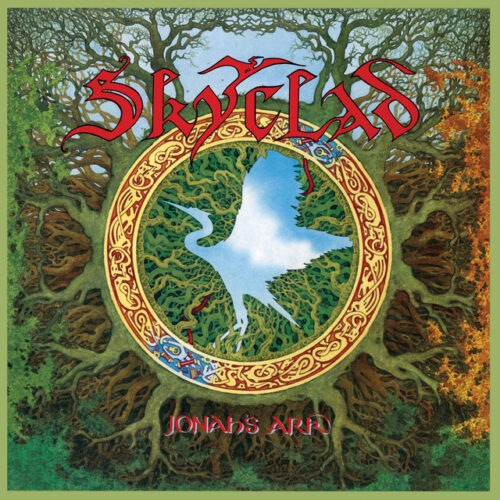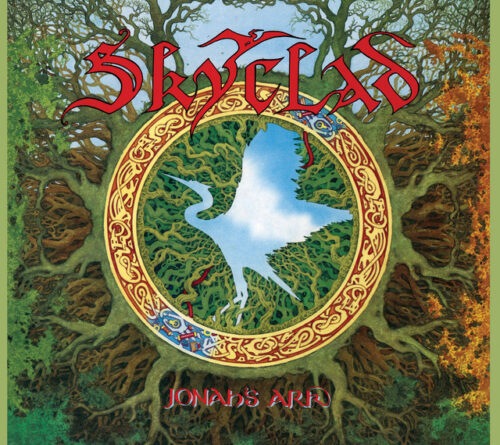HEAVY MUSIC HISTORY: Jonah’s Ark – Skyclad
For a solid chunk of the 1990s, SKYCLAD were one of the UK’s most prolific metal bands. Churning out ten records in as many years, the band evolved from Pagan-inspired pseudo-thrash to full blown folk rock by the new millennium. However, 1993’s Jonah’s Ark, their third record since signing to Noise Records a couple of years prior, was the first realisation of what the band had always aimed to create: folk metal.
Incorporating folk elements in metal was something that vocalist Martin Walkyier had been intrigued by since his tenure in SABBAT. When the cult thrashers eventually imploded, Walkyier found a creative kindred spirit in SATAN guitarist Steve Ramsey, the two forming SKYCLAD alongside bassist Graeme English and drummer Keith Baxter. However, considering the band’s founding vision was to invent “folk metal,” SKYCLAD’s first two albums merely flirted with the idea. The Widdershins Jig off debut The Wayward Sons Of Mother Earth (1991) provided a compelling proof-of-concept for the genre, but the seeds were really sown on their sophomore effort. Slightly more experimental than its predecessor, A Burnt Offering For The Bone Idol (1992) saw Fritha Jenkins recruited as a permanent violinist, along with a second guitarist in Dave Pugh.
The presence of a violin player as a fully-fledged member would fundamentally alter how the band crafted songs for Jonah’s Ark. Speaking in the For Skyclad Fans Only promo video released alongside the album, Ramsey noted that he had started to write music with violins playing the lead parts instead of guitars. Having two guitarists and a lead violin player added an extra level of depth to the band’s song-writing, allowing for harmonic textures that hadn’t been possible before. Walkyier elaborated further that “the violin is something that can add to that mood and create an atmosphere.” While Jenkins isn’t credited with writing the material, her violin is a constant and commanding presence throughout Jonah’s Ark. From the misleadingly serene intro of Thinking Allowed to the reeling jigs of Earth Mother, The Sun And The Furious Host, the violin parts were as ubiquitous as guitars and provided an apt foil to the chunky riffing of Ramsey and Pugh. Jenkins wasn’t the only fresh blood to make an impact however; Pugh contributed to the writing process, offering the song The Ilk Of Human Blindness and various other ideas throughout the album. Speaking retrospectively to Malcolm Dome in 2016, Ramsey remarked, “The style of music changed a lot from the first two albums, partly due to [Pugh and Jenkins’] presence. The thrash influence was replaced with a lot of different grooves.”
With the band now on more solid, if more experimental, musical ground, Martin Walkyier had a new spotlight shone on him. While perhaps not the most technically gifted of vocalists, Walkyier’s biting delivery had been an idiosyncratic gift since the days of SABBAT. His acerbic lyrics flourished within SKYCLAD’s more socially-focussed approach, with Walkyier using linguistic playfulness to articulate even the most cutting of personal reflections. While not a concept album per se, Jonah’s Ark had a recurrent theme of environmentalism running through it. The title itself was a wry allusion to the biblical story of Noah, with Walkyier expanding at the time, “Our planet at the moment is like Jonah’s ark. Jonah is a symbol of bad luck and a bringer of destruction. Our planet is heading for oblivion, unless we start thinking about what we’re doing and help the environment.”
Much of the album is an impassioned rallying cry, replete with cautionary tales about nature’s destruction on cuts like Cry Of The Land and Word To The Wise. Nestled amongst the global warning signs of Jonah’s Ark however, Walkyier also opines about broader social causes. Thinking Allowed is a call to arms for using one’s critical faculties, whereas Earth Mother, The Sun And The Furious Host provides a scathing dressing down of the Christianity-tinged frameworks of Britain. Jonah’s Ark is a lyrically venomous album, with the refreshed musical approaching helping accentuate Walkyier’s messages. It’s depressing how prescient many of Jonah’s Ark’s lyrics remain three decades on, with Walkyier’s musings proving one of the record’s (and indeed SKYCLAD’s) most enduring aspects.
With all the pieces in place in terms of members and material, SKYCLAD were a well-oiled unit by the time they hit Lynx Studios to record Jonah’s Ark. It was just as well, mind – considering it was still an early juncture in their career, SKYCLAD’s home was more often than not on the road, so recording time was always squeezed. They entered the studio well-rehearsed, having had time for the new line-up to gel on Bone Idol’s touring cycle. While recording remained on home-turf, mixing was a slightly grander experience. The band decamped to Monmouth’s famous Rockfield Studios for the mix, walking the same hallowed grounds as rock royalty from MOTÖRHEAD to QUEEN as the final album came together
While it’s hard to say how much commercial impact the record had, Jonah’s Ark was well received by UK press on its release. Kerrang! gave it an enviable 4Ks, even going as far as to argue that SKYCLAD, by virtue of their furious message, would “undoubtedly do more good than Rage Against The Machine” and “their music will probably last much longer”. Thirty years later and it would seem Kerrang! may have sadly over-estimated SKYCLAD’s impact on the world. However, as much as SKYCLAD are often unjustly left out of the canon of influential British bands, they made an indelible mark on metal music with Jonah’s Ark. Firmly establishing their vision of what “folk metal” could be, SKYCLAD defined a new genre with this album, and did so with aplomb. Not many bands can make that claim.

Jonah’s Ark was originally released June 3 1993 via Noise Records.
Like SKYCLAD on Facebook.

